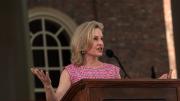At the second annual Alumni Day, when reunion classes and other alumni return to Cambridge—10,000 strong, reportedly—there was music, oratory, and food aplenty. The mood was festive for this first fully post-pandemic 153rd meeting of the Harvard Alumni Association (HAA), now considered the second part of the oldest recurring outdoor ceremony in the Americas—the first part, Commencement, with speaker Tom Hanks, having been celebrated the week prior.
Sewell Chan ’98, who was elected Chief Marshal by his 25th reunion class earlier this spring, led one of the traditional processions into Tercentenary Theatre, while the oldest alumni of Harvard and Radcliffe led another. Chan, currently editor in chief of the Texas Tribune, is a veteran of the Washington Post, the New York Times, and the Los Angeles Times, where he oversaw coverage that was awarded a 2021 Pulitzer Prize for editorial writing. (He is also a member of the board of incorporators of this magazine, where, as an undergraduate, he was a Berta Greenwald Ledecky Fellow and of the boards of the Columbia Journalism Review, Freedom House, and the Pulitzer Prizes.)
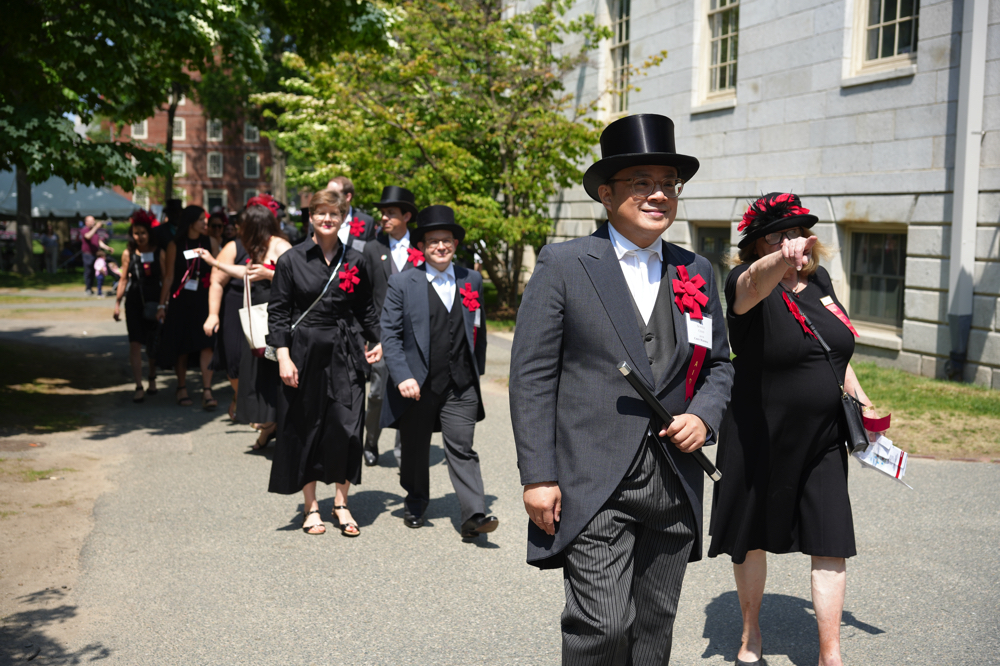
Sewell Chan, leading one of the processions
Photograph by Ryan Doan-Nguyen
The oldest alumni in attendance were Bertram A. “Bert” Huberman ’44, M.B.A. ’48, of Sarasota, Florida, who will celebrate his 100th birthday next week, and 95-year-old Ruth (Samuels) Villalovos ’49, of Cambridge. They braved temperatures that soared into the high 80s, but the Yard’s trees, now in full leaf, afforded some welcome shade for the ceremony, and for the Yard party that followed, featuring food from a dozen different vendors, including familiar undergraduate favorites such as El Jefe’s, Pinnochio’s, and Redbones.
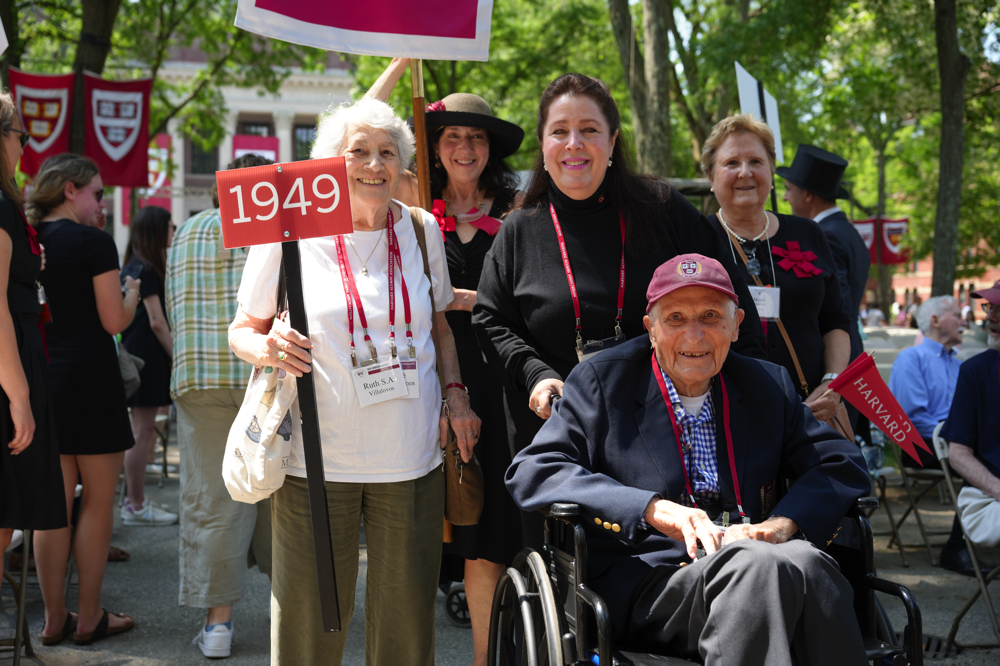
Ruth S. A. Villalovos ’49 and Bertram A. “Bert” Huberman ’44, M.B.A. ’48
Photograph by Ryan Doan-Nguyen
Once all the alumni were seated, the main program began with welcoming remarks and introductions by 2022-2023 HAA president, Allyson Mendenhall ’90, M.L.A. ’99. Mendenhall began with an acknowledgement of the people and lands of the First Nations, noting that “the land on which Harvard is situated has been a place of learning for millennia.” She spoke about her journey of increasing involvement with her alma mater, before recognizing a few special guests: the oldest alumni present, Huberman (to whom the assembly sang “Happy Birthday,”) and Villalovos. (For more about them, see “Oldest and First”). She introduced HAA president-elect president Tracy Moore II ’06, and Chan, the Chief Marshal. And she welcomed to the podium Sarah Karmon, who became executive director of the HAA (succeeding Philip W. Lovejoy) and associate vice president of alumni affairs and development in January. Karmon addressed the alumni body for the first time in her new role, thanking the HAA’s numerous volunteers around the globe.
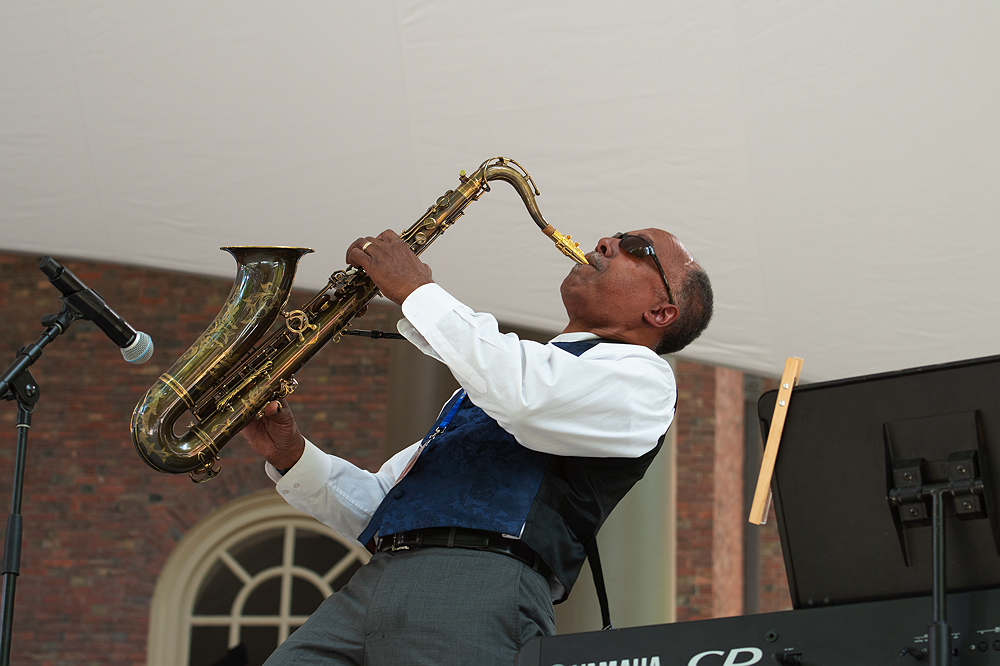
Don Braden
Photograph by Jim Harrison
There were musical interludes by jazz musician Don Braden ’85—he compared the improvisation in jazz to life itself—and by the College’s Kuumba Singers who gave a rousing rendition of “Radcliffe, Now We Rise to Greet Thee” and then, at the ceremony’s close, led the traditional singing of “Fair Harvard.”
Mendenhall then called Bacow to the podium for what would be his last major address as president.
President Bacow Addresses the Alumni
Bacow began by pointing out that “Harvard has been changing lives in this country for a very long time…. Fifty of the 535 members of Congress have Harvard degrees. Four of the nine Supreme Court justices do as well. You will find Harvard alumni in every possible profession: landscape architects, journalists, physicians, lawyers, teachers, writers, musicians, artists, scholars, professional athletes, entrepreneurs, business leaders, public servants, and even university presidents. I could easily go on.” Still he said, in a speech that was as much a personal reflection as it was a distillation of wisdom that springs from life experience, “almost all of us…are products of fortuitous accidents. Serendipity has played a large role in each of our lives. When I think of my own path, it was completely unpredictable. I came to Harvard as a graduate student with visions of being a lawyer. And I ended up here, addressing all of you as President for the very last time. Harvard really helped to change my life. As I conclude my tenure, I continue to be amazed… by this place, and its people….
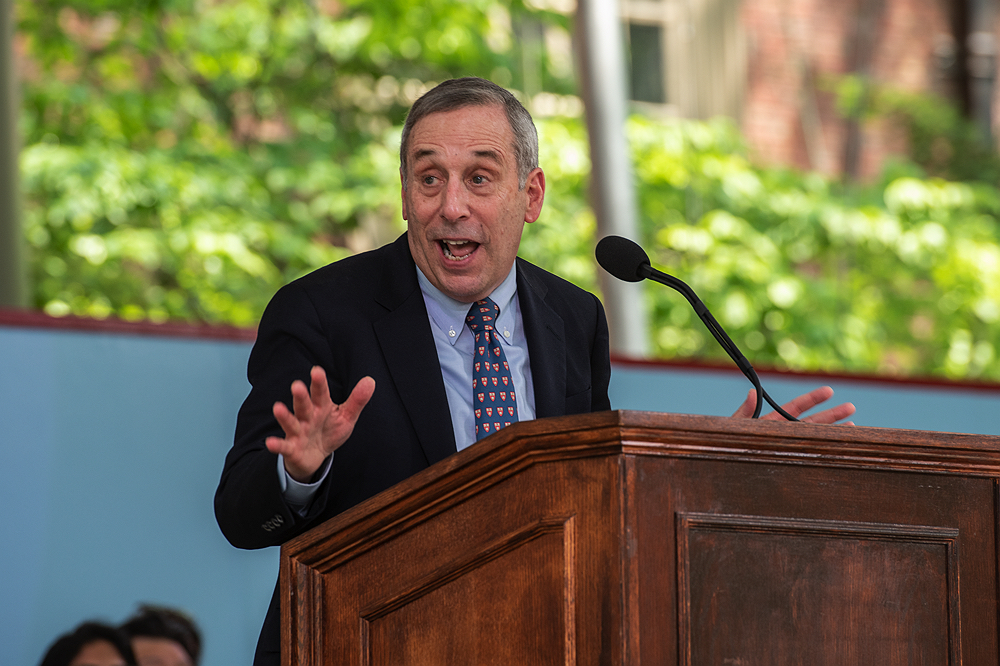
President Lawrence S. Bacow
Photograph by Jim Harrison
Bacow continued in a more conversational vein, a hallmark of his humble and easygoing style. “Being president of Harvard is really a job like no other. Where else do you have the opportunity to work with scholars who are among the very best in the world? Where else can you watch young people come of age, knowing that they will excel in ways that they cannot imagine? And as the son of two refugees, I have pinched myself on many occasions, not believing that this is actually happening to me: walking down the Great Hall of the People in Beijing to meet President Xi Jinping. Welcoming heads of state almost monthly, sometimes weekly, to Massachusetts Hall. Watching our faculty come together to address and protect us from the ravages of COVID. I’ve also marveled at the creativity of our students, our faculty, and our alums who inspire us through their art, their music, their literature, and their poetry. And how often in any job…do you get to congratulate—pretty routinely—Nobel laureates, Rhodes scholars, and people who are earning prizes within our community almost daily?
“While these fast past five years have candidly not been easy,” he continued, “they’ve also been richly rewarding. It’s really been a privilege of a lifetime, to lead and to be part of an extraordinary community, a privilege for which I will always be grateful.”
As to what is in his own future, Bacow said that he has been “trying to figure that out as well. But I suspect it will entail some writing, some lecturing, more time with Adele” (his wife and close advisor of 48 years—they had celebrated their anniversary the day before), “more time with our children or grandchildren, and time for a calendar with long and luxurious stretches of unscheduled time.
“I hope as you look forward from this gathering to the future,” he concluded… “that it is filled with moments of delight, curiosity, wonder, and yes…friendships that have been helped along by this wonderful place. And I hope you share my belief that Harvard has made each and every one of us better because of what happened here when you were students and what continues to happen here routinely. I want to thank you for making me so proud of you. …It’s been an extraordinary privilege to be your president,” he said with genuine emotion, struggling to compose himself. “I want to wish each of you… best of luck. Thank you for the opportunity to do this amazing job. To all of you, farewell and Godspeed.
Honoring the 2023 Harvard Medalists
The event then celebrated the five (not four as shown on the program) 2023 Harvard Medalists, which recognize extraordinary service to the University. The surprise fifth medal was presented by former Senior Fellow of the Harvard Corporation William F. “Bill” Lee ’72 to President Bacow himself. (Read more about the other four here.)
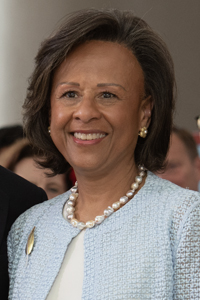
Paula A. Johnson
Photograph by Jim Harrison
Paula A. Johnson ’80, M.D. ’84, M.P.H. ’85, a physician-scientist, educator, and president of Wellesley College, has been instrumental in advancing STEM education for women and focusing on women’s roles and development in other arenas. Prior to joining Wellesley, Johnson served as chief of the division of women’s health and founding executive director of the Mary Horrigan Connors Center for Women’s Health and Gender Biology at Harvard-affiliated Brigham & Women’s Hospital. A world-renowned physician-scientist and college president who has shattered gender and racial barriers in medicine and academia, you have poured your heart into improving the well-being of women globally through your groundbreaking contributions to medical research and your steadfast advocacy for health care reforms and inclusive educational opportunities for scholars in all fields.
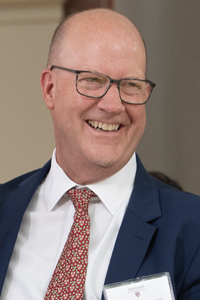
Philip W. Lovejoy
Photograph by Jim Harrison
Philip W. Lovejoy served Harvard for 25 years, most recently as HAA executive director and associate vice president of alumni affairs and development from 2014 until his retirement in 2022. He strengthened alumni engagement in many ways, including through restructuring the HAA board of directors, increasing understanding of the annual elections for Harvard’s Board of Overseers and HAA elected directors, ushering in Harvard Alumni Day, and developing equity and inclusion work. (He was also a member of Harvard Magazine’s Board of Directors.) Beloved leader of the Harvard Alumni Association, you have earned a resounding tip of the Harvard hat from staff and alumni across the world, serving the University with distinction for 25 years, building authentic relationships with trademark thoughtfulness and humor, and blending tradition with innovation to find new ways to engage and celebrate a diverse alumni community.
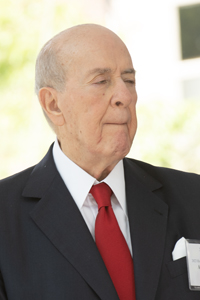
Antonio Madero
Photograph by Jim Harrison
Antonio Madero, M.B.A. ’61, founder of Mexico City-based auto parts company Rassini and former chair of the Mexican Business Council, has helped generations of Mexican students pursue graduate studies at Harvard. Moreover, he has fostered a unique beneficial collaboration between Mexico and Harvard. Fueled by a deep love for Harvard and your home country of Mexico, you have engineered enduring bonds between these two communities, serving as a confidant to Harvard presidents, deans, and faculty; expanding possibilities for Mexican scholars to study and teach at Harvard; and catalyzing knowledge of a region rich in culture and history.
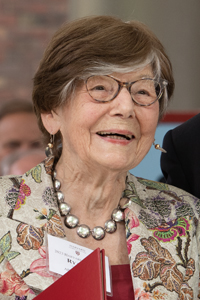
Rya W. Zobel
Photograph by Jim Harrison
Rya W. Zobel ’53, L.L.B. ’56, a pioneering lawyer and distinguished federal judge, has forged a path for women and demonstrated a lifelong commitment to civic values. She grew up in Nazi Germany, escaping East Germany at age 14, and ultimately landed in the United States and went on to become one of 13 women in her Harvard Law School class. Later, Zobel was on the Board of Overseers and served on visiting committees across the University. She also is a recipient of the Radcliffe Alumnae Recognition Award. In a distinguished legal career marked by many firsts, you surmounted extraordinary obstacles—as a teenage émigré escaping oppression and as a woman in a historically male-dominated field—with a tenacity that forged a path for generations to come and a commitment to civic values that shines as an outstanding example to all citizens of the world.
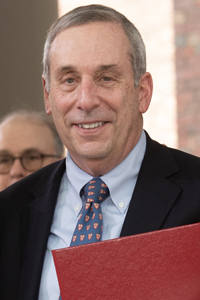
Lawrence S. Bacow
Photograph by Jim Harrison
Lawrence S. Bacow, J.D. ’76, M.P.P. ’76, Ph.D. ’78, the twenty-ninth president of the University, concluded the academic year with his retirement. A quintessential mensch, you have led with integrity and humility, foresight and resilience, deftly harnessing the strengths of Harvard’s extraordinary people in service to the University and the world. As a son of immigrants, your unwavering faith in the power of education to transform lives has driven you to work tenaciously to dismantle financial, geographical, and political barriers to bring students from all backgrounds within reach of the American dream. Slow to judge but quick to understand, you have encouraged open discourse in pursuit of Veritas, challenging Harvard to reckon with its own history. Embodying the Jewish principle of tikkun olam, repairing the world, you have guided Harvard through the pandemic and marshaled the best minds across disciplines to confront great challenges facing society. Your belief that no individual accomplishes anything on their own shines through in your partnership with Adele, beside you at the helm as you have steered Harvard toward an ever-brighter horizon.
Guest Speaker Mary Louise Kelly
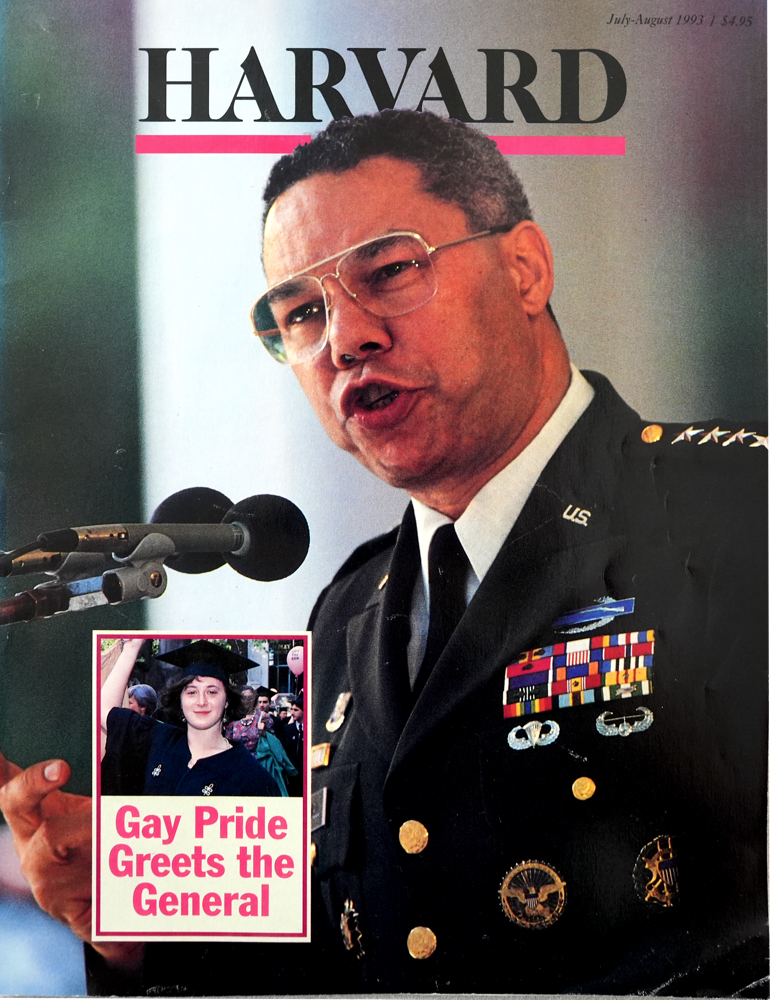
Harvard Magazine's July-August 1993 issue
Photograph of magazine by Ryan Doan-Nguyen
Last to speak was Mary Louise Kelly ’93, back in Cambridge for her 30th reunion, and the featured guest of the day. Kelly, cohost of the National Public Radio news program All Things Considered, spoke evocatively about her work as a journalist—she was formerly national security correspondent for NPR News—and witness to the vicissitudes of democracy, both abroad and at home. She began by recalling the moment, 30 years ago, when “the person standing at this lectern was Colin Powell. He was the Chairman of the Joint Chiefs of Staff, the highest-ranking officer in the U.S. military. And he was stepping into a hostile arena. The Crimson had just printed a letter to the editor headlined, ‘There Could Be No WORSE Choice for Commencement Speaker.’ People were angry over the First Gulf War. People were angry over the military’s “ban on gays,” as we described it back then. There were pink balloons emblazoned with “Lift the Ban” floating here around the Yard. Security was intense. Some faculty and students—my classmates, this was our Commencement, class of 1993—they stood and turned their backs on the General as he was awarded an honorary degree.”
Powell addressed the protesters, and said, “I believe we are near a solution.”
Kelly confessed that although she “was there,” listening, “sitting somewhere out there where you sit today…I do not remember any of this first-hand. I don’t actually recall a single thing the General said. That morning 30 years ago I was focused on packing up and…also on this cute boy who I’d kissed the night before…. That morning I was wondering if I’d ever see him again. And I never have….
If I was distracted on that June morning in 1993,” Kelly continued, “happily my fellow reporter, Stephen Frank of The Crimson was not. The account he penned of the day included, among other details, that as Powell finished, a standing ovation ‘almost drowned out’ the planned protest.” “My point is,” she added, “I can relate details of Colin Powell’s speech to you today because The Crimson and other news organizations were there to document it.”
And with that prelude, Kelly described the role of the press in “bearing witness.” She quoted BBC correspondent Caroline Wyatt, who said of journalism at its best, that it “‘shines a light towards solid ground for those caught in the storms raging through our democracies.”
For those of you who lived through and remember the 1990s, you may recall that it seemed… We were living through the irreversible blossoming of democracy, of prosperity. Francis Fukuyama —our fellow alum; he got his Ph.D. here—wrote “The End of History,” a book in which he pronounced the ascendancy of western liberal democracy as the final form of human government. And in those years, the 1990s, at the end of the Cold War, it seemed as though he might be right. I was a young reporter, I graduated from here and started learning how to be a foreign correspondent. I was dispatched to Germany, where the Berlin Wall had fallen. The Oslo Accords were signed and opened a window for hope—maybe a framework for peace in the Middle East. In Northern Ireland, the groundwork for the Good Friday agreement was being laid. I went to Belfast and interviewed Protestants and Catholics as they embarked on a fragile experiment to govern together. And it seemed the Troubles were… relegated to history.
It emerges that this was not the end of history. 9/11 happened. Wars followed... in Afghanistan. In Iraq. We journalists filed from the frontlines.
Years passed and here at home, OUR politics veered into uncharted waters. If you were listening to NPR on January 6, 2021, you would have heard me anchoring live coverage of an armed insurrection inside our nation’s capital. And I was trying along with the rest of you to figure out, in real time, what the hell was happening.
“Whatever your politics,” Kelly continued, this was an “awful day in our democracy.” Importantly, journalists were there, protected by the First Amendment, to document what had happened.
Kelly compared that to an experience she had reporting in Iran. She interviewed people in the street, and even Iran’s Foreign Minister, whom she asked “why journalists in Iran were being prevented from doing their job…. The foreign minister told me that people in Iran are free to speak their mind. I told him that is not true. I told him that many were visibly frightened to speak to a foreign journalist. That they pointed up, and scanned for cameras and whispered… ‘They’re watching.’”
In the months prior to her arrival, brutal repression had led to the deaths of hundreds of protestors, and it appeared that the protests had been quashed. “On the surface,” said Kelly, “things in Iran seemed…calm.
“But there is one moment that stands out,” she continued, “that will stay with me. On the eve of Revolution Day, which sees pro-regime rallies every year to mark the anniversary of the 1979 revolution, the government laid on a big fireworks display. My team and I were back at our hotel in Tehran, working, typing up our stories and listening as the fireworks boomed across the night sky, when one of my producers suddenly cocked her head. ‘What are they saying?’ she asked. And we threw open the windows and stepped onto our balcony to hear cries of ‘Marg <<Mag>> bar deek-tah-tor’
‘Death to the dictator!’
‘Death to Khamenei!’
‘Freedom! Freedom! Freedom!’
Over and over.
“That moment,” Kelly said, “revealed a narrative very different from what the government wanted us to see and hear. And we would have missed it, had we not gotten on a plane and witnessed it firsthand.”
My invitation to all of us today—she concluded—is to look around at this place. Consider what it has offered us. To recall the sense of possibility we once felt when we first stepped onto this campus. First sprinted past this library, late to class. First strolled beneath these trees. That sense of promise when our whole lives lay ahead. When anything seemed possible.
Kelly closed with a poem, the words of Mary Oliver, penned at a moment in which she found herself beneath a tree:
My right hand
Was holding my left hand
Which was holding the tree
Which was filled with stars
And the soft rain—
Imagine! Imagine!
The wild and wondrous journeys
still to be ours.
“Friends,” Kelly closed: “Whether we’re back today for our 5th reunion, our 30th, our 55th, our 75th… and beyond. Who says we’re done? Who… says… we’re… done?”
